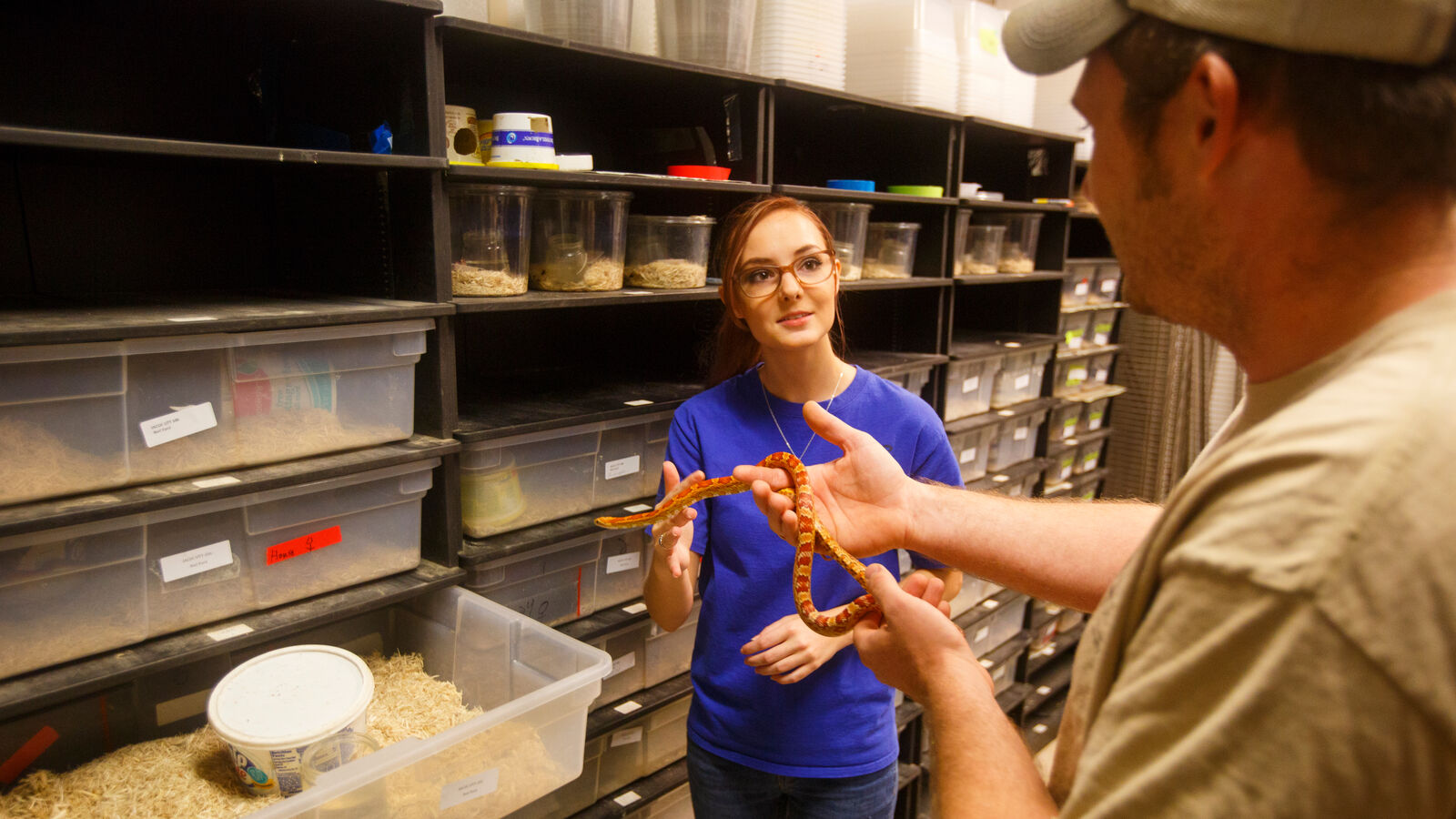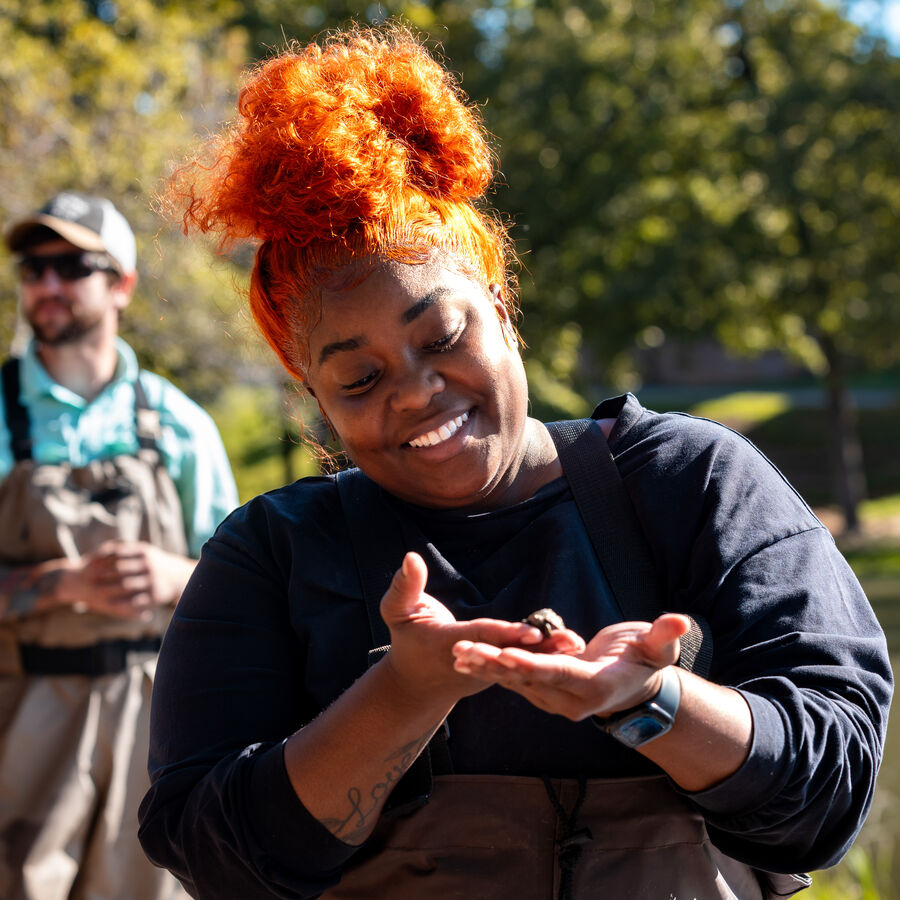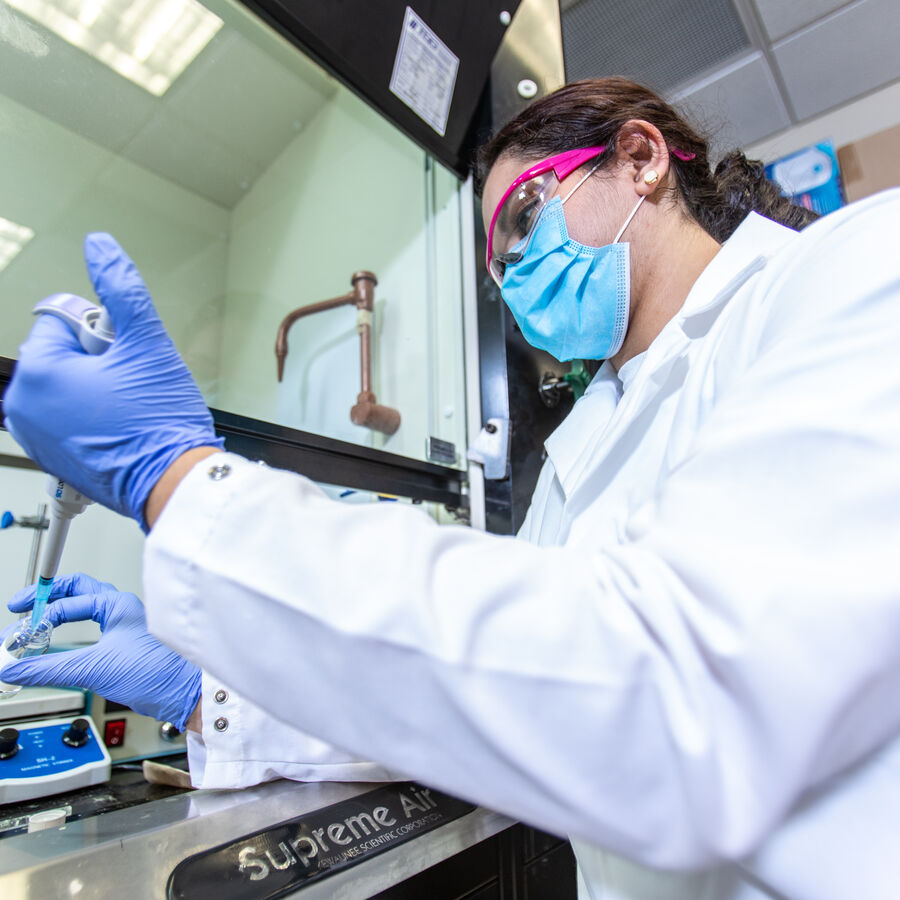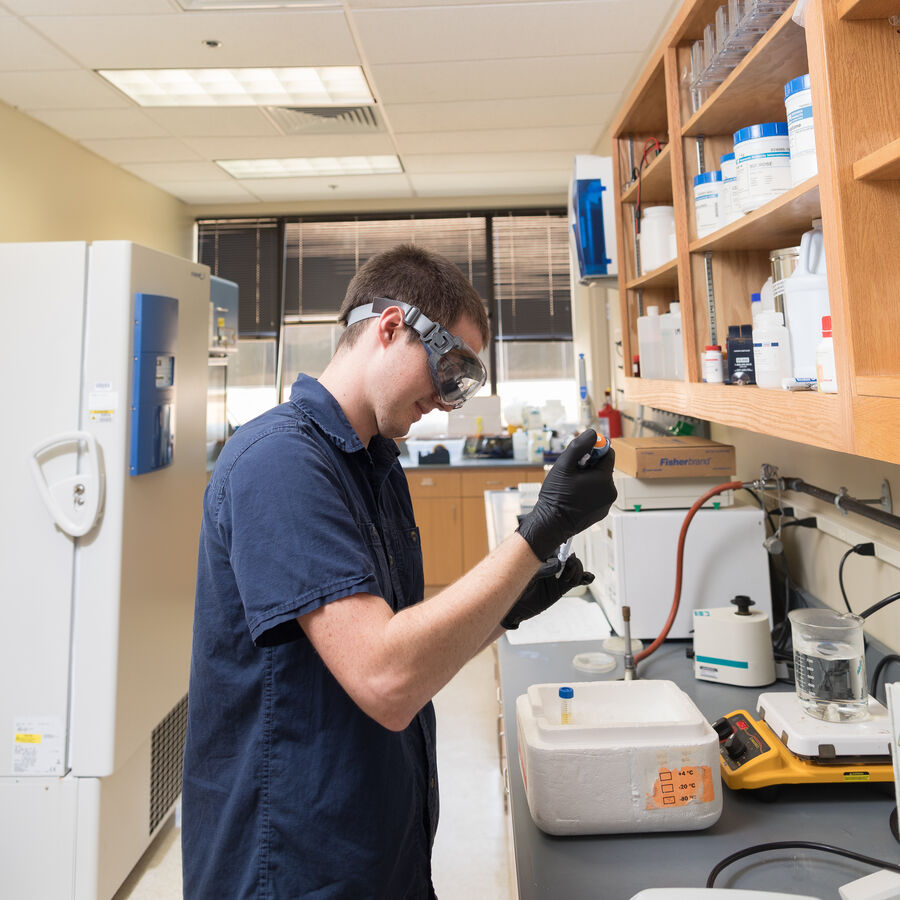
Master of Science in Biology
Pursue Your Passion for Biology
You’re fascinated by the intricacies of life. You have a hunger to understand and a curiosity that drives you to explore. You also want to make a difference through the power of scientific research. With The University of Texas at Tyler’s Master of Science in biology, learn to use research to solve problems and discover solutions that benefit people and the planet.
Join a community of passionate, engaged researchers at UT Tyler. Our master’s in biology program will deepen your knowledge of living systems and sharpen your skills as a scientist, so you can confidently move forward in your career or prepare for doctoral study. Plan your next move through a choice of two formats: develop a thesis based on original research, or enter a non-thesis track culminating in a professional paper.
Why Earn a Master’s in Biology at UT Tyler?
Our world faces many challenges that research in biology can help solve, ranging from fighting disease to protecting ecosystems from the impacts of waste and development. You already have the drive to help uncover solutions. But, you recognize your need to enhance your existing knowledge and research abilities so that you can influence or lead drug trials, medical discoveries and a more sustainable society.
The MS in biology at UT Tyler equips you to make an impact as a scientist, whether that means continuing with doctoral studies or entering a research or industry role upon graduation.
Here’s how we help you prepare:
- Experienced Faculty Mentors: Become part of a research-centered community. You’ll learn from active scholars who are pursuing original research and act as mentors to empower your professional growth. A low student-to-faculty ratio and average class size of under 10 mean plenty of individualized attention and support along the way.
- An Active Research Environment: Get involved in research projects intended to preserve the ecosystems and species of East Texas. The UT Tyler Center for Environment, Biodiversity and Conservation brings together faculty and graduate students from five departments to devise innovative solutions that decrease pollution, expand what we know about ecology, protect biodiversity and support environmental policy.
- Exceptional Facilities: Learn the tools of the trade with state-of-the-art equipment and specialized facilities, including molecular biology laboratories, environmental chambers, an herbarium, landscape ecology laboratories and geographic information system (GIS) technology.
- Field Research Opportunities: Get outside the lab and conduct research in aquatic and terrestrial field sites located throughout campus and the region.
- Affordability: Build your skills without building a burden of debt. We offset our already low tuition with graduate assistantships, scholarships and other forms of financial support.
Curriculum
The Master’s in biology is a 30-credit-hour course of study you can complete in two years. The curriculum is designed to strengthen your skills as a researcher, so you can go on to further studies at the doctoral level or confidently apply what you’ve learned in your career.
Learn to gather, organize and analyze complex data with courses on statistics and research methods. Working from this foundation, you have the flexibility to explore and build your knowledge in the areas that most interest you, from biogeography to plant physiology to evolutionary genetics.
In your final year, contribute to the field as you write a thesis based on your own original research project. Or, if you’re eyeing career advancement, you’ll produce a non-research-based professional paper and prepare for a comprehensive exam.
During your time at UT Tyler, you’ll:
- Better understand complex biological systems on molecular and environmental levels.
- Undertake research in laboratory and field settings using scientific equipment and procedures.
- Plan and pursue original research projects.
- Develop expertise in specific areas of biology.
- Source and evaluate scientific research literature.
- Collect, organize and analyze large and complex datasets.
- Communicate technical and complex information in a clear and organized manner.
- Grow in appreciation of the ethical contours of biological research and human interactions with the environment.
- Creatively form data-informed solutions to complex problems.
See All MS in Biology Degree Requirements Visit the Biology Department
What Can You Do With a Master’s in Biology?
The sharp analytical and research skills you’ll develop with an MS in biology point toward multiple career paths.
The research focus of the program, together with robust faculty mentorship and support, provides an excellent foundation for doctoral studies in biology. In this direction, you’ll continue to deepen your expertise in preparation to teach and conduct research at the university level.
You’ll also be ready to put your research skills to work right away in government laboratories, research organizations or industry. According to the Bureau of Labor Statistics, the job market for biochemists and biophysicists will grow by 15% in the current decade. These scientists design and guide studies that build upon what we know about biology and its applications, from testing theories to leading advances in healthcare and environmental preservation. Microbiologists, a subset of this group focusing on microorganisms, will also see robust job growth.
Given UT Tyler’s strengths in the areas of ecology and conservation, you can also step into a role as an environmental scientist or wildlife biologist. You’ll help government agencies, nonprofits, businesses and community organizations conduct research, educate the public and craft policies that promote environmental stewardship and enable sustainable growth.
How to Apply
To be considered for admission to the MS in biology program, you must have a bachelor’s degree in science from an accredited institution with a minimum GPA of 3.0 or equivalent. You will also need a satisfactory GPA on all prior advanced (junior, senior and graduate) coursework undertaken.
Before applying to the program, you should introduce yourself to the biology faculty with whom you share strong research interests. If there is more than one faculty member whose research interests you, introduce yourself to all of them. Don't be afraid to contact the faculty. They would like to hear from you.
Your application must include the following:
- A completed online application.
- A statement of research interests.
- Official transcripts for all prior college- or graduate-level work, submitted to the Office of Graduate Admissions.
- Letters of recommendation are not required but highly encouraged.
- A résumé or curriculum vitae.
- Applicants with an undergraduate degree from a non-U.S. institution must have a satisfactory TOEFL score (or its equivalent) and an international transcript evaluation. Learn more about what an evaluation entails and how to provide proof of English proficiency.
Additional considerations for admission may include: your demonstrated commitment to your chosen field of study, geographic region of residence and level of responsibility in other matters, including extracurricular activities, employment, community service and family responsibilities.
March 1
Application deadline for summer or fall admission.
September 1
Deadline for students seeking admission for the following spring.
October 1
The Free Application for Federal Student Aid (FAFSA®) opens for the upcoming academic year.
Spotlight

Explore Related Programs
Next Steps
Your future starts here. Get equipped to make an impact through research at UT Tyler.


